Working on average 42 hours per week, UK employees work the longest hours in Europe.
But how much time is spent working unpaid overtime and on unpaid tasks technically outside of their job remit?
We conducted a survey of 1,051 British adults to explore how much time employees are really spending “going above and beyond” their job duties.
The survey also identified the types of tasks employees are most likely to find themselves doing on top of their actual work, and how they feel about taking on these extra responsibilities.
Key findings
- The average UK employee spends 4.7 hours per week working overtime and on tasks outside of their job description – this equates to 5.2 weeks worth of work a year
- The average British worker does £4,063.52 of unpaid work every year
- 8 in 10 UK workers have completed tasks at work outside of their job description – and for 71.6% of employees, this work is not compensated.
- The most common tasks employees do outside their duties is providing tech support (66.4%), providing emotional support (61.5%) and cleaning or organising work areas (60.7%).
- Gen-Z are more likely (94.4%) than Boomers (73.3%) to complete tasks outside their job description.
- Women were more likely than men to provide emotional support at work (68.9% compared to 55.3%).
How much time are people spending on tasks outside their job description?
Working overtime – time spent working after the usual time needed or expected in a job – is a common experience. The majority, 85.7% of employees said that they work overtime, at an average length of 2.6 hours per week.
But on top of this workload, many employees also find themselves saddled with tasks outside their job duties. 85.1% of employees say they complete tasks outside of their official job description, at an average length of 2.1 hours per week. Combined, this is 4.7 hours of additional labour.
Considering an employee who takes 28 days of annual leave and works for 46.4 weeks per year, this means that an average employee spends roughly 120.6 hours working overtime per year, and an additional 97.4 hours on tasks outside their official job duties. [1] Combined, this adds up to 218 hours – 5.2 weeks of extra work. According to the majority of surveyed employees (71.6%), this work is likely uncompensated but if this labour were compensated this would be an additional £4,063.52 a year (considering the UK average hourly rate of £18.64 at the time of writing). [2]
How much time per week do you spend on tasks at work outside of your actual job description?
| Time period | Outside job description | Overtime normal work |
|---|---|---|
| I never spend time on other tasks | 14.9% | 14.3% |
| 0 – 30 minutes | 23.6% | 14.7% |
| 30 – 60 minutes | 16.9% | 15.2% |
| 1 – 2 hours | 19.0% | 19.1% |
| 2 – 4 hours | 11.8% | 14.5% |
| 4 – 6 hours | 7.3% | 9.7% |
| 6 – 8 hours | 2.9% | 5.2% |
| 8 – 10 hours | 1.7% | 3.1% |
| 10 – 12 hours | 0.4% | 1.5% |
| 12 – 14 hours | 0% | 0.6% |
| More than 14 hours | 1.5% | 2.1% |
| Average length of time: | 2.1 hours | 2.6 hours |
What can you do if you are asked to do tasks outside your job description? Company restructures, mergers or economic instability can all cause your job description to change – which can in turn sometimes mean more, and different, responsibilities. But as your job description is a legally binding contract, it cannot be changed significantly without your consent. And, if you do find your responsibilities increase or become more complex, you should be offered financial compensation in the form of a pay rise.
What tasks are people doing outside of their job description?
Being asked to make a coffee for your boss may be an office cliche, but in reality, it’s one of the least likely ways you might feel taken advantage of at work. Instead, the study identified five tasks that more employees than not had undertaken outside their job role. These were: tech support (66.4%), emotional support (61.5%), cleaning and tidying (60.7%), onboarding and training others (57.7%), and performing tasks for other departments (56.9%).
Some additional duties are more time consuming than others. The longest average time spent per week on any one activity was performing tasks for other departments (33.7 minutes), on-boarding or training team members (32.8 minutes), and providing tech support for colleagues (31.8 minutes).
Common tasks performed outside of the job description
| Task | Percentage of respondents | Average time taken per week (minutes) |
|---|---|---|
| Providing tech support for colleagues | 66.4% | 31.8 |
| Providing emotional support for colleagues | 61.5% | 29.7 |
| Cleaning or organising working areas | 60.7% | 28.5 |
| Onboarding or training team members | 57.7% | 32.8 |
| Performing tasks for other departments | 56.9% | 33.7 |
| Running errands | 42.8% | 17.7 |
| Making drinks for others | 37.2% | 13.4 |
| Organising events | 36.1% | 16 |
| Making food for others | 19.5% | 11.4 |
1. Providing tech support for colleagues (if not part of your job role)
Do you know how to convert a Word document into a PDF? How about making a pivot table in Excel or creating an email signature? Technology is quickly evolving, and it can feel difficult to keep up with the necessary skills. If you are more tech-savvy, you may find a good proportion of your time is spent getting colleagues up to speed and answering their tech queries. Overall, 66.4% said they had provided tech support for colleagues, and the average employee spends 31.8 minutes per week doing so.
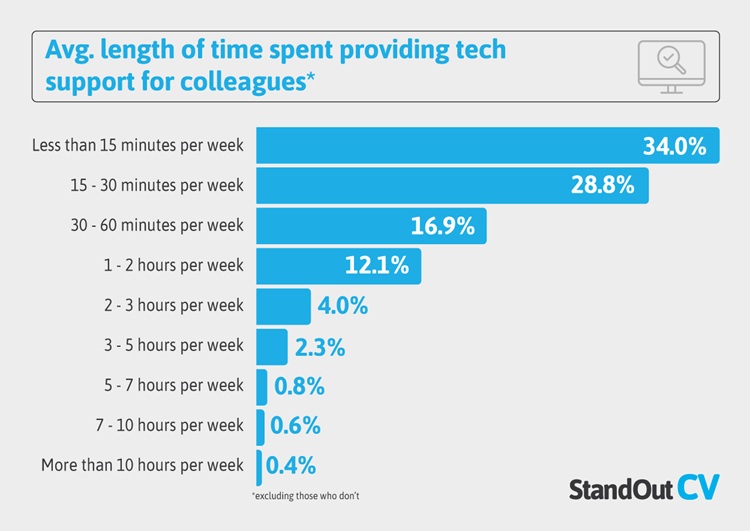
And you were much more likely to have offered tech support and advice the younger you were. Four in five (79.6%) Gen-Z respondents (aged between 18-28) said they had spent additional time helping with tech support, compared to 48.8% of Boomers (61-79).
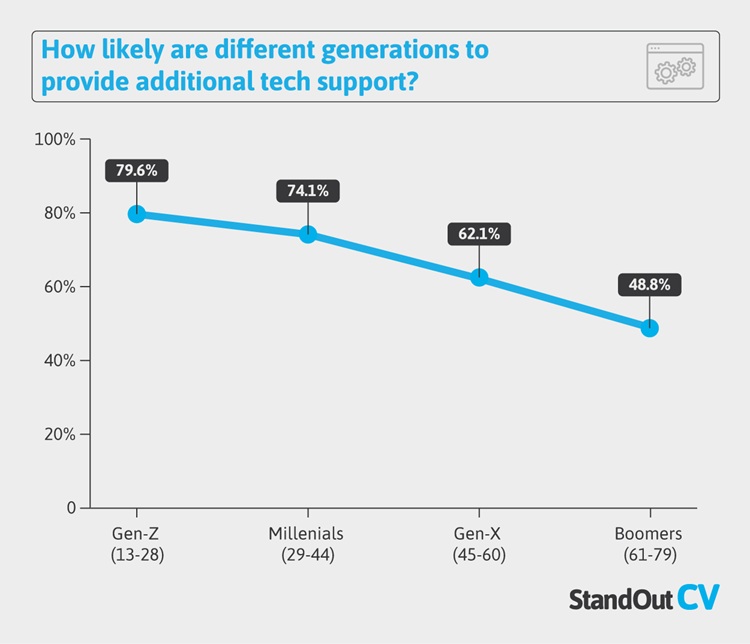
2. Providing emotional support for colleagues
It’s good to be there for your colleagues. However, there’s a difference between lending an ear to a colleague having a tough time, and taking on the responsibilities you might expect a paid professional to undertake.
There are many professional roles that exist to ensure employees have someone to turn to for support: these might include an HR team, a people or culture manager, a well-being officer or staff counsellor. However, not all businesses – especially small businesses – hire for these positions. This means that sometimes, people feel the need or pressure to take on pastoral roles themselves, on top of their other responsibilities.
Overall, three in five (61.5%) said they had provided emotional support for colleagues which they felt went above and beyond what might be standard, collegial support. The average length of time a respondent spent providing this level of emotional support was 29.7 minutes per week.
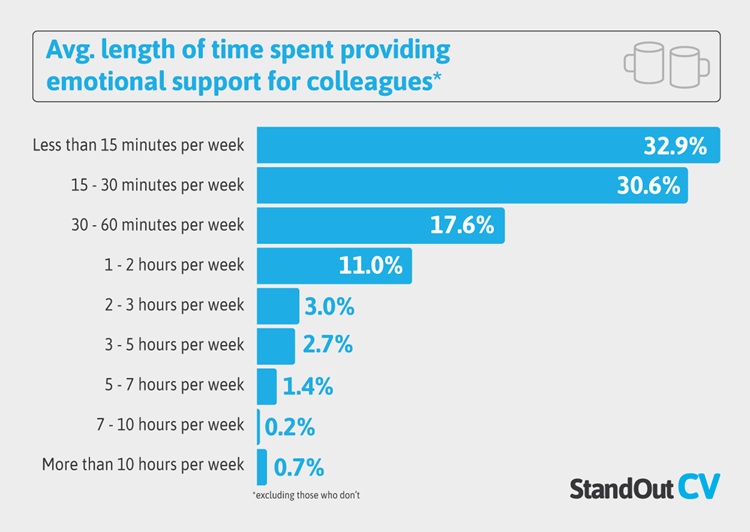
Women were more likely than men to say they provided this kind of care (68.9% compared to 55.3%). And the average length of time providing this kind of care was also greater for women than men (35 minutes compared to 25 minutes per week).
Rose Hackman, a journalist and researcher, popularised the term ‘emotional labor’ to explain the “soft-skill” responsibilities like these that often fall on the shoulders of women employees. She says “A lot of women entering workplaces that were previously male-dominated are finding that they are expected, by virtue of being women, to provide an added shift of emotional labour”. [3]
3. Cleaning or organising working areas
Your workspace is your own responsibility to keep clean and clutter-free, but sometimes employees might find themselves tidying up after others too. Examples of this might include organising shared spaces like a communal kitchen in an office, or a classroom if you are a teacher or teaching assistant. Overall, 60.7% said that they had cleaned or organised work areas at an average of 28.5 minutes a week.
An article in the New York Times argued that women spent more time than their male counterparts on “office housework”. [4] But what did respondents in our survey say? There was only a small difference between the proportion of men (59.9%) and the proportion of women (61.5%) who said that they partake in office housework. In fact, women reported spending slightly less time (26.4 minutes per week) on the task compared to men (30.4 minutes).
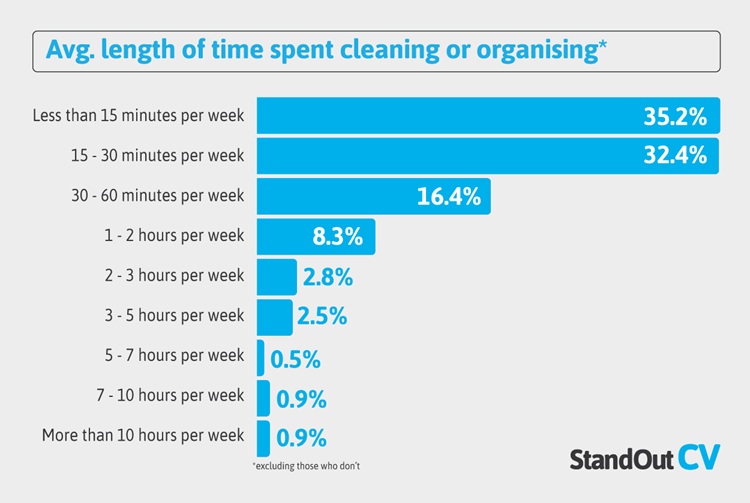
Differences by age and working location
There is plenty of debate around whether remote work is making employees less – or more – productive. [5] [6] But according to the survey, it’s actually in-person employees who were the least likely to spend time on extra tasks or work overtime. Those with a hybrid set-up (working both on-site and at home) were the most likely employees to go the extra mile – with 91.8% reporting having worked overtime, and 90.2% reporting that they had picked up tasks outside their job duties.
Likelihood of working overtime or beyond job specification per work location
| Remote | Hybrid | In-person | |
|---|---|---|---|
| Work overtime | 80.8% | 91.8% | 78.8% |
| Complete tasks outside their job description | 80.8% | 90.2% | 80.7% |
Do Gen-Z really have a work ethic problem? [7] The data from this survey challenges this perception. In fact, the younger you were, the more likely you were to pick up tasks that fall outside your official duties. Nearly all the Gen-Z respondents (aged between 18 and 28) said that they completed tasks outside their job description, compared to 73.3% of Boomers (aged 61 to 79), with a steady decline across the generations between.
How likely are different generations to work overtime or outside the job description?
| Gen-Z (13 – 28) | Millennials (29 – 44) | Gen X (45 – 60) | Boomers (61 – 79) | |
|---|---|---|---|---|
| Work overtime | 92.6% | 93% | 82.1% | 70.9% |
| Complete tasks outside their job description | 94.4% | 91.5% | 81.1% | 73.3% |
Boomers also spent on average around 1.2 hours per week completing tasks outside their job description. This is around half the time spent by Millennials (2.3 hours) and Gen-Z (2.1 hours) employees.
How long are different generations spending on work outside their main job description?
| Gen-Z (18 – 28) | Millennials (29 – 44) | Gen X (45 – 60) | Boomers (61 – 79) | |
|---|---|---|---|---|
| Avg. hours spent per week on tasks outside of job description | 2.1 | 2.3 | 1.7 | 1.2 |
Why are people taking on roles outside their job description?
There are many reasons why an employee might take on extra tasks. One employee may feel pressured by senior management. Another may be proactively finding opportunities to go above and beyond to impress their employer.
Only 23.7% of respondents said they took on these extra tasks due to explicit instructions from management or colleagues. The rest of the respondents were internally motivated – either out of personal desire or unspoken, implicit pressure.
Just above a quarter (26.5%) of those surveyed said that they took on these extra tasks due to an internal sense of responsibility and 3.6% because they believed doing so would help them get ahead. One in four said they felt compelled to because of unspoken workplace culture (25.8%) or short-staffing (20.2%).
Where do you think the pressure to take on additional tasks primarily comes from?
| Answers | % of respondents |
|---|---|
| My own internal sense of responsibility | 26.5% |
| Unspoken workplace culture | 25.8% |
| Short-staffing | 20.2% |
| Explicit instructions from management | 14.1% |
| Pressure from colleagues | 9.6% |
| Career development | 3.6% |
How people feel about being asked to take on work outside their job role also varied. Just over half of respondents, 51.7%, said they felt a positive or neutral response – like feeling valued (16.7%), important (17.7%). But the other half of respondents (48.3%) said they felt frustrated (18.4%), overwhelmed (17.2%) and unfairly treated (12.7%).
How did taking on these extra non-role related activities make you feel?
| Answers | % of respondents |
|---|---|
| Frustrated because it wasn't my job | 18.4% |
| Like a key part of the team | 17.7% |
| Neutral - it didn't impact my much | 17.3% |
| Overwhelmed or stressed | 17.2% |
| Valued and appreciated | 16.7% |
| Like I was unfairly burdened | 12.7% |
If employees are explicitly asked to take on additional errands by management or colleagues, – and left feeling burnout and frustrated – how comfortable did they feel about asserting their boundaries and saying no?
Considering the respondents who had been asked to complete a task outside their job description, nearly half (46.2%) said they have never felt comfortable declining the request. But perhaps respondents needn’t be so afraid of pushing back. More respondents who had declined the extra work felt their refusal was respected (33.8%) than received badly (20%).
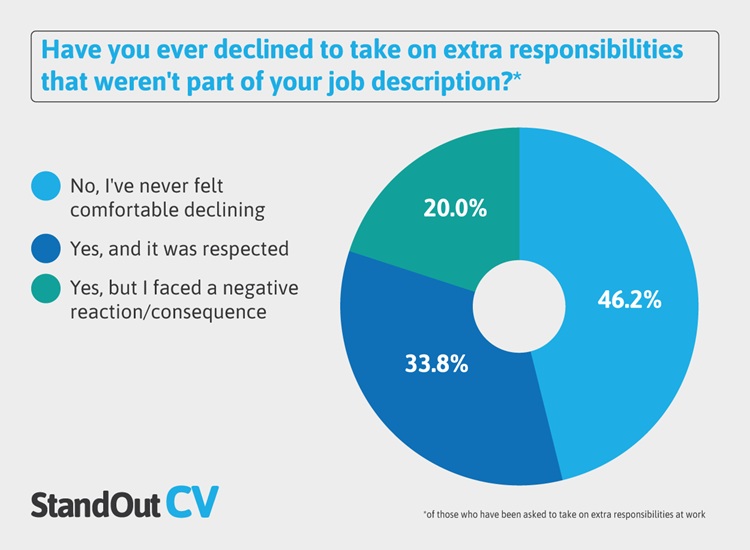
Opinions were also very split on how taking on extra duties affected primary job duties. Of those who had taken on tasks outside their job description, half (50.7%) said it had had a negative impact – with 36.6% saying the effect was slight, and 14.1% saying it actively distracted them from their actual job duties.
A minority, 7.6% of respondents, said they found that these extra errands had a positive impact on their job role. The remaining 41.7% said that the impact was neutral, and their main responsibilities were left unaffected.
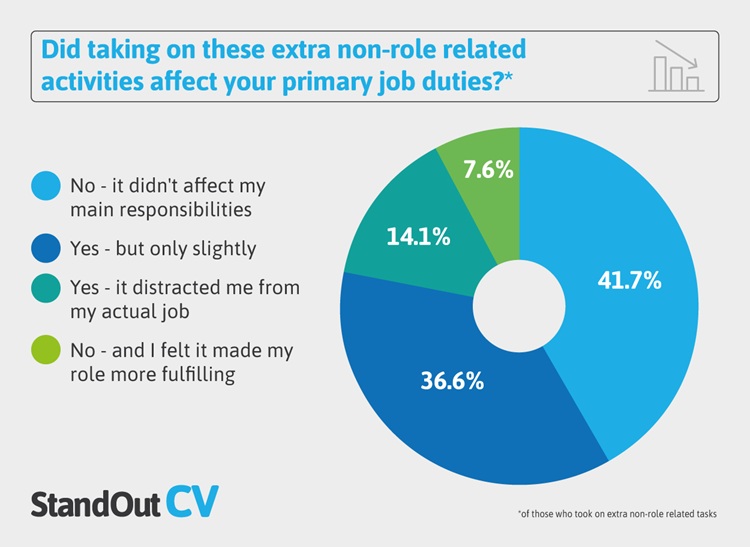
Sources
[1] GOV.UK, ‘Holiday pay and entitlement reforms from 1 January 2024’
[2] House of Commons Library, ‘Average earnings: Economic indicators’
[3] BBC, ‘The extra shift’: The unpaid emotional labour expected of women at work’
[4] New York Times, ‘Madam C.E.O., Get Me a Coffee’
[5] CFO Tech, ‘Survey shows UK remote workers face high productivity anxiety’
[6] BBC, ‘Could we be seeing the end of working from home?’
Methodology
We surveyed 1,051 British adults in February 2025. The survey was designed to find out how much time employees were spending on tasks that were outside of their job description, and on working overtime in general. The survey also identified which tasks these were, and how long was being spent weekly on individual tasks.
In addition to this, the survey also explored the motivating factors behind taking on these additional tasks and the consequences of doing so.
Gender
- Male 54%
- Female 46%
Age
- Gen-Z (18 – 28) 7.6%
- Millennials (29 – 44) 37.9%
- Gen X (45 – 60) 42.3%
- Boomers (61 – 79) 12.1%
- Post War (80+) 0.1%

This work is licensed under a Creative Commons Attribution-ShareAlike 4.0 International License.


